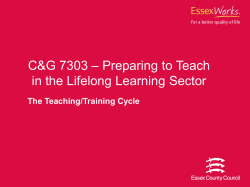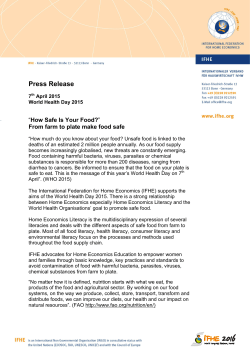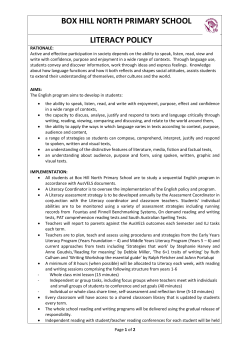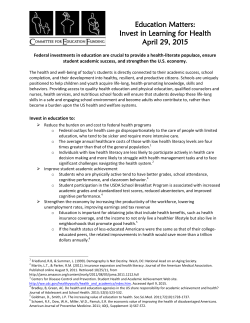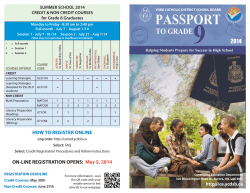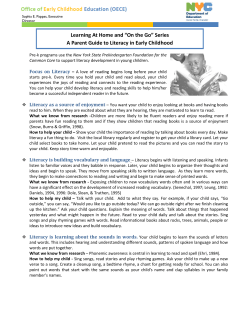
Building Professional Pride In Literacy
Building Professional Pride In Literacy A Dialogical Guide to Professional Development for Practitioners of Adult Literacy and Basic Education by B. Allan Quigley Building Professional Pride in Literacy brings a fresh hands-on approach to adult literacy professionals. It uses a conversational method so the practitioner can build skills and knowledge through self-directed professional development. Readers will learn ways to teach adults with low literacy and ways to conduct their own problem-posing, problem-solving research on teaching problems. They will see how today’s programs have built on the rich history of adult literacy. Dr. Quigley says, “Ours is a field of hope in a cynical, fearful time. This book will build pride in practitioners and across the field of practice and in policy.” B. Allan Quigley, Ed.D., is a professor of adult education at Saint Francis Xavier University in Nova Scotia, Canada. He began teaching adult literacy in 1972 in Northern Saskatchewan and has since worked as an adult literacy teacher, professor, community developer, and senior administrator in adult basic education with Canadian community colleges. He was a senior adult education policy advisor and manager in government in Canada. For 10 years he was a professor of adult education with Pennsylvania State University. The recipient of numerous awards, he has researched and published extensively on the topic of adult literacy. His work is internationally known. Orig. Ed. 2006 CONTENTS Preface How to Make Best Use of This Guide Three Ways to Use This Guide for Staff Development Acknowledgments The Author Introduction Here’s What You’ll Need to Use This Guide to Best Effect The Six-Step Process in Using the Guide A Checklist of the Steps Involved Two Questions You May Have 1. The Higher We Climb: What Is A Professional? Opening Questions to Begin Your Learning Journey The Head, the Hand, and the Heart: A Framework for Professionalism My Own Views and Biases on Professionalism Where Does the Concept of “Professionalism” Come From? The Best of Reasons: Beginning with Strength A Look at What Literacy Practitioners Say Looking at What the Literature Tells Us Can’t We Take a More Balanced Approach? Learning from Praxis Putting the Praxis-Approach into Practice Moving on with Journaling Checking for Progress Chapter 1 Discussion Topics for Consideration in Your Learning Journal and Learning Circle Chapter 1 Activity Options for Followup Chapter 1 Further Reading 2. Building On Our Past For A More Professional Future Chapter 2: Pre-Chapter Questions for Your Learning Journal The Challenges of Professionalizing To Right a Wrong: Literacy and Salvation in Bristol, England, 1812 Literacy for Freedom: The Port Royal Experiment, 1862-1865 Wherever and Whenever: Canada’s Frontier College, 1899 to Today Humble but Official Beginnings in the U.S.A.: The Moonlight Schools of Kentucky, 1911 Literacy for Democracy: Hull House, 1899 Knowledge for the People: The Antigonish Movement, 1931 Chapter 2 Discussion Topics for Consideration In Your Learning Journal and Learning Circle Chapter 2 Activity Options for Followup Chapter 2 Further Reading 3. Why Do We Teach? Reflecting On Purposes And Practice An Opening Activity Some Things I Believe Why Do We Teach? To Be Educated: The Liberal Adult Education Philosophy The Liberal Education Philosophy in Your Classroom Come On, Let’s Find Out: The Progressive Adult Education Philosophy 244 pp. ISBN 1-57524-262-1 $32.50 The Progressive Philosophy in Your Classroom Getting Students Job Ready: The Vocational Adult Education Philosophy The Vocational Philosophy in Your Classroom The Learner Comes First: The Humanist Adult Education Philosophy The Humanist Philosophy in Your Classroom Liberate, Don’t Domesticate: The Radical Adult Education Philosophy Using The Radical Philosophy in Your Classroom What I Believe: Some Further Reflections Chapter 3 Discussion Topics for Consideration in Your Learning Journal and Learning Circle Chapter 3 Activity Options for Followup Chapter 3 Further Reading 4. Bringing It All Together: Teaching And Learning In Daily Practice How Does Teaching Adults Differ from Teaching Children? Literacy Learners’ Way of Knowing Now for Some Special Literacy Considerations How Can We Address Our Learners’ Situational Barriers How Can We Address Our Learners’ Institutional Barriers How Can We Address Our Learners’ Dispositional Barriers Developing an Interdependent Learning Program A Plan Focusing on the First Three Critical Weeks and Your Practice Philosophy The First Class Meeting Moving Beyond Intake and into Our Own Practice Philosophy Putting the Liberal Philosophy or the Vocational Philosophy Into Practice Putting the Progressive and Radical Philosophies into Practice Using the Humanist Philosophy in Literacy and ABE Teaching Chapter 4 Discussion Topics for Consideration in Your Learning Journal and Learning Circle Chapter 4 Activity Options for Followup Chapter 4 Further Reading 5. Creating Our Own Knowledge, Claiming Our Own Future Building a Professional Field on Our Own Knowledge Base The Need for Increased Research Capacity and Research Credibility Using Action Research in Our Daily Work The Four Main Phases of Action Research Phase One: Problem Posing Phase Two: Planning the Action Research Project Phase Three: The Observing Phase Phase Four: The Reflection Phase Where to from Here? The Widening Value of Action Research But Is Action Research Really Valid and Reliable? A Proposal for Interdependent Learning Across Our Field First We Must Dream – Nothing Is Harder Chapter 5 Activities You Might Consider Choosing Data Collection Techniques Chapter 5 Further Reading 6. Closing Note: Professional Development As “A State Of Mind” References Index KRIEGER PUBLISHING COMPANY 1-800-724-0025 Other Titles of Interest DESIGNING INSTRUCTION FOR ADULT LEARNERS by Gary J. Dean 2nd Ed. 2002 154 pp. ISBN 1-57524-205-2 $25.50 Dr. Dean’s work is a model to aid adult educators in the development of instructional activities for adult learners. The three-part model consists of gathering information, designing instruction, and evaluating the instructional plan. The data gathering phase emphasizes systematic reflection on the adult educator’s knowledge and skills, the adult learners, the content to be learned, and the organizational context in which the learning takes place. In the designing instruction phase the development of instructional goals and objectives, learning activities, and learner assessment is explored. Evaluation is accomplished by systematically reviewing the instructional plan and how it was developed. The model encourages the participation of adult learners in the process. It is a flexible approach to planning instruction. READING THE WORLD OF WORK: A Learner-Centered Approach to Workplace Literacy and ESL by Melina L. Gallo Orig. Ed. 2004 160 pp. ISBN 1-57524-217-6 $24.00 The author describes the ways in which workplace literacy programs can use a creative learner-centered approach to facilitate language learning through problem posing and critical thinking. By using learners’ own experiences as the basis for the curriculum in a critical approach to literacy, educators can provide a common ground for adults of differing language backgrounds and learning styles to better use their literacy skills in a workplace culture. Additionally, the book details the ways in which educators can help workers learn to negotiate the environment of their workplace and to use their communicative skills outside of work. DEVELOPING LITERACY PROGRAMS FOR HOMELESS ADULTS by Joye A. Norris & Paddy Kennington Orig. Ed. 1992 128 pp. ISBN 0-89464-794-6 Paper $14.00 Orig. Ed. 1992 128 pp. ISBN 0-89464-679-6 Cloth $19.50 Traditional programming approaches to literacy education may be inadequate when dealing with the complexities of homelessness. Among the factors affecting program design for homeless adults are the trauma of homelessness and the difficult environments in which instruction takes place. These factors combined with the broad range of homeless adults’ educational needs have led to a fresh approach to both literacy education and program design. This book offers readers an examination of eight roles of literacy education in the overall services to homeless adults. It suggests program goals, teacher training guidelines, and six proven models of instruction. TEACHING ADULTS WITH LEARNING DISABILITIES by Dale R. Jordan Orig. Ed. 1996 160 pp. ISBN 0-89464-910-8 $25.50 Teaching Adults with Learning Disabilities is designed to teach literacy providers and classroom instructors how to recognize specific learning disability (LD) patterns that block reading, spelling, writing, and arithmetic skills in students of all ages. One of the major problems faced by literacy providers is keeping low-skill adults involved in basic education programs long enough to increase their literacy skills to the level of success. This book will show instructors at all levels, and especially instructors in adult education, how to modify teaching strategies and curriculum to accommodate the special needs of LD learners. TEACHING ADULT ENGLISH LANGUAGE LEARNERS by Richard A. Orem Orig. Ed. 2005 166 pp. ISBN 1-57524-219-2 $23.75 This resource brings together information about policy, second language acquisition theory and research, methods and materials for teaching adult English language learners, program design, and cross-cultural issues that effect learning in adult ESL classrooms. It also discusses the context within which adult ESOL instructors work and in which adult ESOL programs function. The framework for this discussion of context draws from the developing framework of standards for teachers of adult learners under consideration by TESOL (Teachers of English to Speakers of Other Languages, Inc.). This book is designed for faculty and students in adult education graduate programs and other TESOL preparation programs at the undergraduate and graduate levels that target adult learners. Other audiences are adult ESL program directors and policy makers as well as educators working in elementary and high school, many of whom are connected to populations of adult learners through the parents of the children they serve. To place your order and obtain shipping costs call 1-800-724-0025 or e-mail us at: info@krieger-publishing.com Order Directly from Krieger Publishing Company for Immediate Shipment DEPARTMENT NUMBER 8049 (Please use this number when ordering by phone, fax or e-mail.) ☞ Please Print DOMESTIC SHIPPING INFORMATION Please Send The Following Books: Author/Title Price Shipments are made by UPS unless otherwise requested. Please add $7.00 for first book, $1.50 for each additional to cover shipping. Florida residents please add sales tax. Examination copies must be requested on school letterhead. MasterCard, VISA, and Discover accepted. Prices subject to change without notice. ____________________________________________________ $ ______________ ____________________________________________________ _______________ FOREIGN SHIPPING INFORMATION ____________________________________________________ _______________ Shipping costs are available on request. Please contact Krieger Publishing Company for more information regarding our foreign distributors. ____________________________________________________ _______________ ______________________________________________ Subtotal _______________ ______________________________________________ Shipping _______________ _________________________________________________ Total $ ______________ Name __________________________________________________________________ Credit Card Information Card Number MasterCard VISA Discover I have enclosed a check or money order in the amount of $____________ or charge to my credit card as indicated above. Expiration Date Mailing/Street Address ____________________________________________________ ______________________________________________________________________ Country _____________________________ Postal Code/Zip(+4) _________________ Tel: ________________________________ FAX: _____________________________ e-mail: _________________________________________________________________ (2000) 8/2006 Quig811 8049 Authorized Signature KRIEGER PUBLISHING COMPANY P.O. Box 9542 • Melbourne, FL 32902-9542 (321) 724-9542 • FAX (321) 951-3671 1-800-724-0025 • e-mail: info@krieger-publishing.com www.krieger-publishing.com
© Copyright 2025



